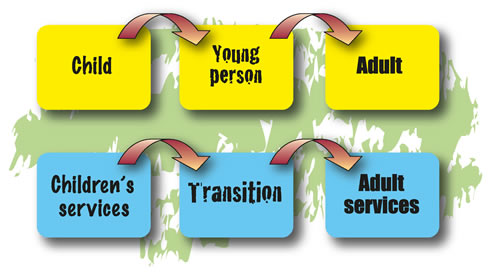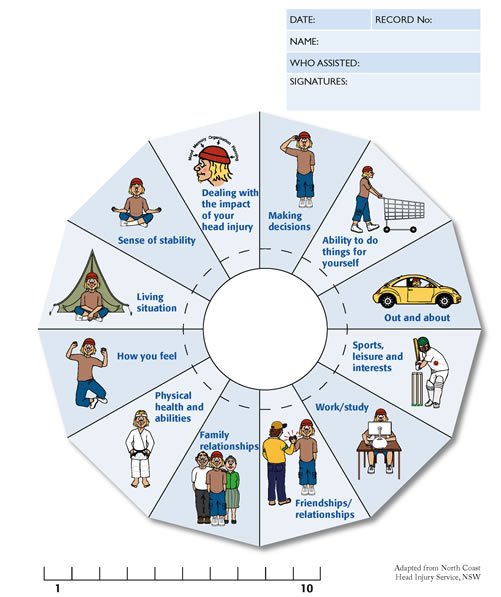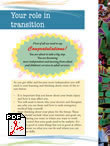- TOOL KITS
- A. The NEXT Step
- B. Promoting Independence
- C. Phone Apps
- D. Return to Work
- E. Motivational Interviewing
- F. Paediatric Brain Injury Rehabilitation Resources
- a) Introduction
- 0. Introduction
- 1. Transition
- 2. The transition wheel
- 3. Walking around the transition wheel
- 4. The transition wheel interview
- 5 . Using this kit
- 6 . Web resources
- b) Working together
- 7. My role
- 8 . My family's role
- 9. My case manager's role
- c) What can I do?
- 10. Who, where, what? The Services I receive
- 11. Accommodation
- 12. Driving
- 13.Alcohol and drugs
- 14. Social and recreational activities
- 15. Health and well-being
- 16. Relationships and friendships
- 17. Sexuality
- 18. Personal safety
- 19. Complaints/rights
- 20. Legal issues
- 21. Centrelink
- 22. Financial
- 23. Shopping
- 24. Employment, training and tertiary education
7. My role in transition
- 7.1 Understanding transition
- 7.2 Adult services are different
- 7.3 Being more independent
- 7.4 The transition wheel
Transition
As everyone matures from childhood to adulthood they have to change from using children’s services to using adult services.
When you start to think about leaving school you will also need to think about linking up with some adult services. People will be talking to you about this transition.
Transition is the planned move from services for children to services for adults.

When does transition occur
The people in your team will start talking about your move to adult services when
- you are in high school or
- when you are about 13 years old or
- close to when you are discharged from hospital if your injury has occurred after you are 13 years old.
Transition is talked about this early to give you enough time to get used to the idea of leaving the children';s services and to learn new tasks that will help you to be more independent.
Transition ends when you start seeing the adult services and stop seeing the children's grain injury rehabilitation team.
This usually occurs close to then you leave school.
Adult services are different
Like every adolescent, as you get older you will become more independent. You will want to do more and more things for yourself. You will not need your family to do as much for you.
This is the same in the adult services. They will require you to be more independent. People working with you may want to speak with you directly and ask your opinion. Your case manager, rehabilitation staff and your doctor will encourage you to make decisions about your life. They will not always ask your parents.
The decisions you may be involved in may be about how you care for yourself, how you get around your community , what job or what you do with your time.
You may know how to do these things already but there may be other things that you can learn to become more independent.
In an adult service they may talk about some things you have never talked about before. These may include issues such as sexuality, drugs and alcohol and birth control. These are all important issues that you will need to know about as you become an adult.
Going into adult services also means that you will be leaving school. To fill in your time you will need to look at where you would like to work and if you need some training for this, when and where you will see your friends and what sort of physical activity you will do.
Changing to adult services also involves saying goodbye to the people who helped you in the children's services. This can be difficult and scary, especially if you have known them for a long time. This time of your life can also be exciting and demonstrate that you a getting older and that life is changing as you become an adult.
The children's service will not say goodbye to you until they think you have become more independent and are ready to make the move.
Becoming more independent
First of all we need to say congratulations. You are about to make a big step. You are becoming more independent and moving from school and children's services to adult services.
As you get older and become more independent you will need to start learning and thinking about some of the issues below.
- It is important that you know about your brain injury and how it may affect you.
- You will need to know who your doctors and therapists are, why you see them and how to seek emergency medical help yourself.
- Start thinking about your plans for the future. These plans should include what your interests and goals are, what training you want or where you want to work.
- Keep in mind that your goals need to be realistic. Everyone is good at some things but not as good at others. Concentrate on what you can do and where you can use these skills. Your role in transition
- Ask your parents, friends and family what they think you could learn to do. You may not have thought about some of the things they suggest.
- You need to know that you have the right to be treated with respect and have your opinion heard. If you do not think that you are being treated fairly you may want to learn who can help you make a complaint.
- Try to look after your own money and pay for some items. You may want to learn how Medicare, private health insurance and your compensation payout work.
- Look at the tasks that you still need to learn to become more independent. Ask for some help learning these. You may need to learn how to clean the house, wash clothes, catch public transport.
- Your doctor will start talking directly with you to obtain your view.
Your case manager may sit down with you to work out your plan for transition. They may talk to you about many of these issues. To become more independent you will need to put in some effort to learn new skills. You will also be saying goodbye to the doctors and therapists that have helped you a lot. Although this may be difficult to do it is a good sign that you are becoming an adult and more independent, just like others your ages.
The transition wheel
The transition wheel has been set up to help you to make the move to adult services. It looks at the areas you may be able to improve your independence.
This best bit is that it is YOUR wheel. You get to choose which areas you think you need to work on.
The Transition Wheel can help you right through the time of change to the adult services. It will be regularly reviewed so you can look at your progress and concentrate on other areas as they become important.
The wheel consists of areas that make up each part of life:
- Making decisions
- Ability to do things for myself (including household chores, medication)
- Out and about - moving around your community
- Sports, Leisure and Interests
- Work/Study
- Friendships/Relationships - eg romantic relationships, sexuality
- Physical Health and Abilities
- How you Feel - mood, emotions, behaviour, anger management
- Living Situation - where you live
- Sense of Stability - who you are, what you do, future options
- Dealing with the Impact of Your Brain Injury



